In the quiet hamlet of Bidnija, one would find a small blue door, which is the main entrance to Equilibrium Malta, an animal practice which integrates conventional veterinary medicine and complementary medical modalities.
Equilibrium Malta is owned by Dr Zoran Jankovic, who after obtaining his degree in veterinary medicine from the University of Belgrade, moved to Malta to pursue his career as a vet. The Malta Independent visited Dr Zoran at his practice to learn about his therapeutic approach to his patients' health.
During our visit, Dr Zoran was treating Gandalf, a 13-year-old Labrador, who in the past few years suffered from chronic cough and arthritis, and after taking numerous medications and antibiotics, his owner, Charlotte saw no improvement. Once Dr Zoran began his treatment on Gandalf, he began to show signs of improvement straight away. From having very low energy levels, and only being able to walk 15 minutes; now Gandalf is capable of walking for up to two hours. In addition to regular acupuncture sessions Gandalf is also taking Chinese herbal medicine formula.
Although slightly hesitant at first during the treatment, all eyes on the newsroom's team, Gandalf finally settled down, as both Dr Zoran and Charlotte petted him. After taking care of Gandalf, Dr Zoran sat down and spoke to Giulia Magri about his practice and the use of traditional Chinese Veterinary Medicine.
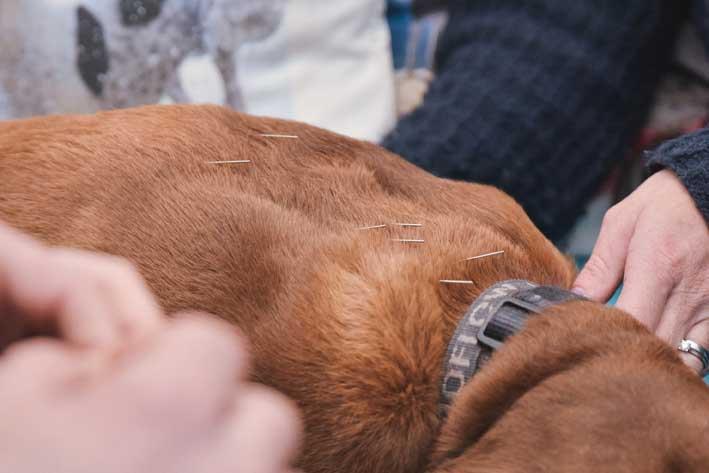
What led you to excel in such a profession?
From a very early age I was fascinated with zoology, biology, natural sciences and a love for animals. It is difficult to explain, but from the moment I could talk I have always wanted to be a vet. This calling grew stronger with a love and interest for science in school. Today, this love is fueled by a passion for helping others, both animals and their humans. I think the key in excelling in any profession is love and passion for what you do.
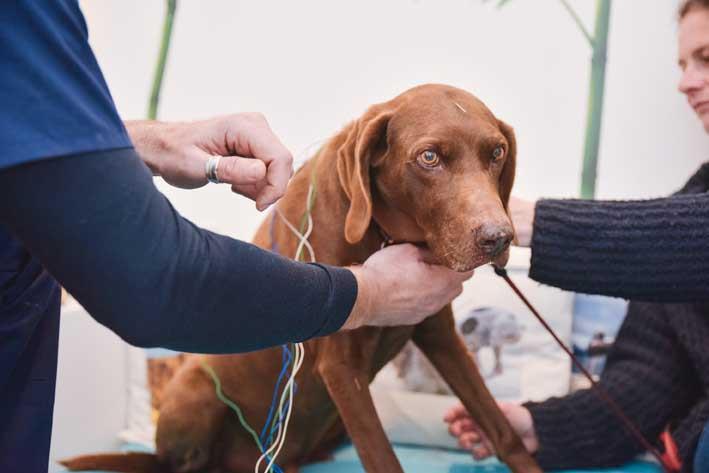
How would you describe traditional Chinese Veterinary Medicine?
Traditional Chinese Veterinary Medicine (TCVM), although relatively new to the Western world, is a medical system that has been used in China to treat animals for thousands of years. It is an adaptation and extension of Traditional Chinese Medicine (TCM) used to treat humans. Speaking broadly, Chinese medicine is a complete body of thought and practice grounded in Chinese Daoist philosophy.
In Chinese medicine theory, disease is understood as an imbalance in the body, and diagnosis proceeds through identifying the underlying "pattern" of disharmony. Pattern diagnosis differs from conventional Western medical diagnosis in that it takes into account not only disease signs but how these signs relate to the individual patient. Thus, TCVM practitioners will consider the temperament, sex, age, activity and environment of an animal along with the animal's particular disease signs. This approach stems from the belief that the body is as an interconnected system of forces and functions so that disease and disharmony must be examined with respect to the whole patient. For this reason, Chinese medicine is often regarded as more holistic than conventional Western medicine.
Once a particular type of disharmony or disease pattern is identified, treatment often proceeds through a combination of treatment modalities. Though the terms Chinese medicine and acupuncture are often used interchangeably in the West, acupuncture is actually only one modality or "branch" of TCM and TCVM. There are four branches of TCVM - Acupuncture, Herbal medicine, Food therapy and Tui-na - a wide range of therapeutic massage and body work.
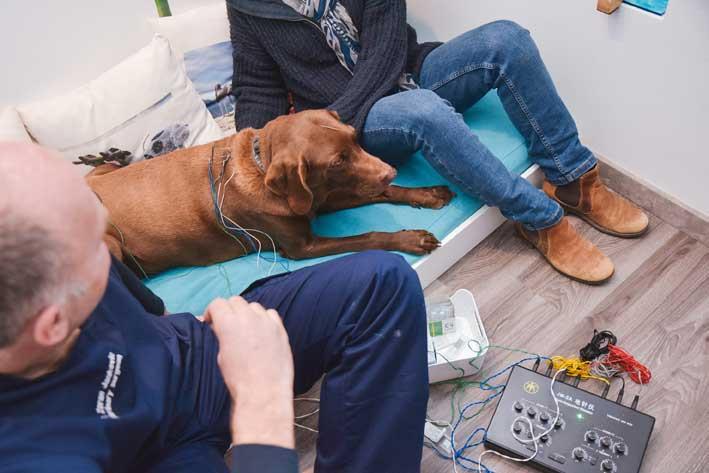
What inspired you to focus on more Traditional Chinese Veterinary medicine and internal medicine?
After obtaining a formal education in veterinary medicine and practising for several years, I realized that standard veterinary treatment was not always the most effective means of curing illnesses. This prompted me to search for additional methods and complementary practices that can be used in veterinary medicine. After experimenting with many "alternative" practices, in 2016 I decided to obtain a certification in Traditional Chinese Veterinary Medicine from the Chi Institute of Europe in Madrid.
At the beginning I was pretty sceptical as I had very little experience with Traditional Chinese medicine in general. However, as soon as I immersed myself in the study, I began witnessing results that can only be described as miraculous. I will never forget our first practice class at the Chi Institute. We were working with a horse that was fractious, almost dangerous. The tutor used a TCVM scan (by applying pressure to meridians and specific acu-points) and diagnosed the horse with severe pain due to gastric ulcers. As soon as the tutor placed acupuncture needles in the horse, his facial expression and whole demeanor started to change in front of our eyes. He transformed into a relaxed and agreeable horse in a matter of minutes, and even began showing affection to the therapist with gentle head nudges. This certainly caught my attention.
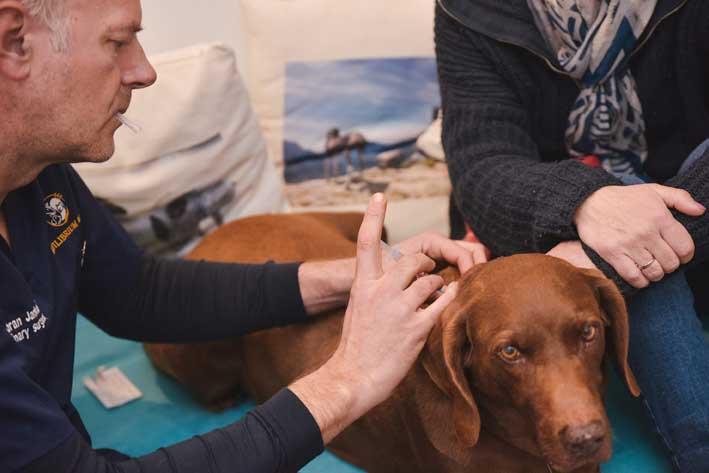
Was it difficult to integrate Traditional Chinese Veterinary medicine into your existing practice?
My first acupuncture case, as soon as I finished my TCVM training, was my long time patient, a very sweet dog named Buddy. One day after a boisterous romp on the beach, Buddy ended up paretic on his hind legs and he was in a lot of pain. I was still in Madrid when this happened and Buddy was treated with the usual Western medication protocol. However, there was no improvement and Buddy's pain was in fact getting worse. After treating Buddy and applying everything I had just learnt from Chi Institute, his owners had called me, to inform me that Buddy was relaxing in his bed with all four legs in the air; something which he hadn't done in weeks! After a couple more weekly treatments Buddy was able to run like nothing ever happened. From then on I was hooked on Chinese medicine and I never looked back.
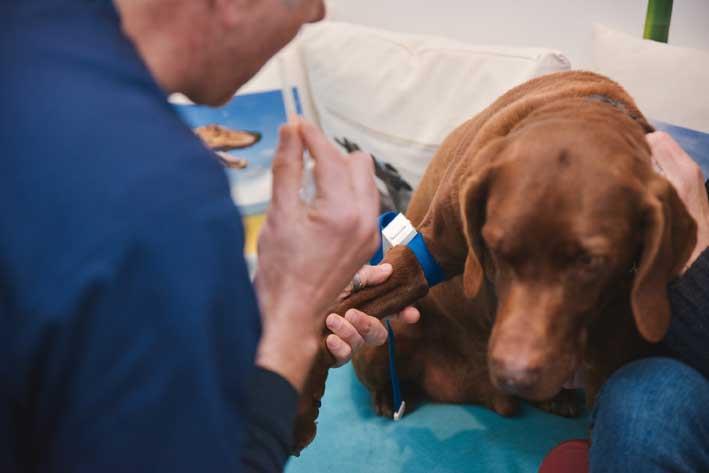
Many have labeled you as a holistic vet; would you describe yourself as such?
I think terms such as "holistic" or "natural" are very often abused and misused these days. We can often see a range of various services and products that are labeled as "holistic" while in reality they are anything but holistic and natural and have very little to do with evidence-based medicine.
I would say I practise integrative medicine for animals. Integrative medicine incorporates all appropriate and evidence-based therapeutic approaches from both conventional and complementary medicine, that are likely to improve an individual patient's health and well being. I do believe integrative medicine is the future for both human and animal medicine.
Why do you believe moving away from conventional medicine to more alternative and 'holistic' practices benefit animals?
I never really "moved away from conventional medicine". I don't see medicine as "conventional" or "alternative", I just see different sets of tools that we may have at our disposal. I am very happy that I have more than one set of tools in my veterinary bag. For example when you compare Western veterinary medicine and traditional Chinese veterinary medicine you may see them as separated by great abyss. However, bridging this gulf is not an impossible task.
Generally, the goals of both Western or conventional medicine and traditional Chinese veterinary medicine are the same; they both promote health and prevent disease. They are merely two different ways of viewing the world and each system has its strengths and weaknesses. For example Western medicine deals efficiently with acute diseases and has advanced surgical techniques. Chinese medicine, on the other hand, can be beneficial for chronic disease, especially those that Western medicine can only control but not cure.
One of the procedures you provide is acupuncture. Could you explain the procedure and how this benefits the animal?
Acupuncture is a form of treatment that involves inserting very fine needles through the skin at specific points on the body, to various depths. The classical Chinese explanation is that channels of energy run in regular patterns through the body and over its surface. These energy channels, called meridians, are like rivers flowing through the body to irrigate and nourish the tissues and organs. An obstruction in the movement of these energy rivers is like a dam that backs up in others.
By needling the acupuncture points, the needles unblock the obstruction at the dams, and reestablish the regular flow through the meridians. Acupuncture treatments can help the body's internal organs to correct imbalances in their digestion, absorption, and energy production activities.
Modern day scientific research continues to confirm classical Chinese theory. Previously, scientists used a combination of imaging techniques and CT scans to observe concentrated points of microvascular structures that clearly correspond to the map of acupuncture points created by Chinese energy practitioners in ancient times. In a study published in the Journal of Electron Spectroscopy and Related Phenomena, researchers used contrast CT imaging with radiation on both non-acupuncture points and acupuncture points. The CT scans revealed clear distinctions between the non-acupuncture point and acupuncture point anatomical structures.
On your website you also speak in detail regarding a natural diet for pets. Could you explain how focusing on your pet's diet will benefit the pet's welfare?
In my clinical experience, a wide variety of different health conditions can be healed by simply changing the food without any other medical intervention and this is pretty much in line with the ancient Ayurvedic proverb: "If diet is wrong, medicine is of no use. If diet is correct, medicine is of no need."
Even before studying food energetics in Chinese medicine it was clear to me that the majority of health problems and degenerative conditions in our pets stem from an inadequate diet, exactly the same like in humans. For over a decade now I have been advocating for what we call biologically-appropriate diets for our pets. Therefore, I recommend nutritionally-balanced, species-appropriate diets, which means fresh food containing high-quality animal protein, moisture, healthy fats and fibre, with low to no starch content.
The new research continues to provide us with fascinating insights into the importance of gut micro biome. We now know that these tiny microorganisms, which live in both our and our pets' digestive tract, play a key role in the normal functioning of the whole body. Feeding highly-processed and biologically inappropriate food causes severe microbial imbalance in the gut and this has a domino effect on a wide variety of health parameters.
This articles was published first in It's an Animal's World Supplement and sponsored by Air Malta